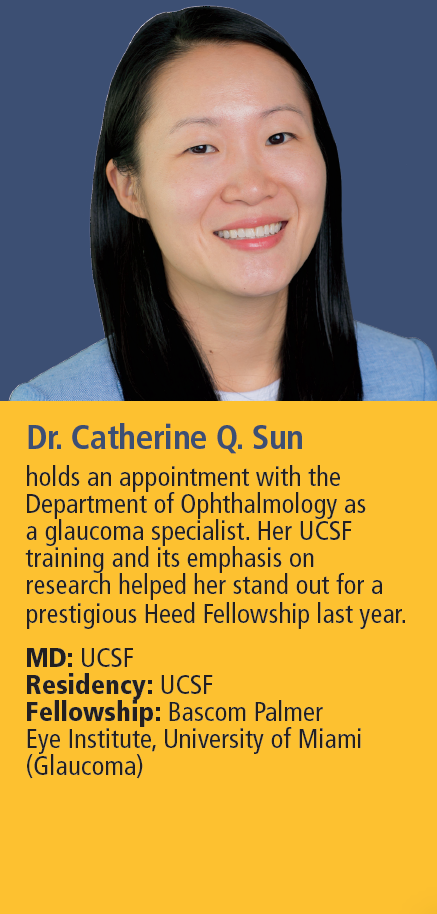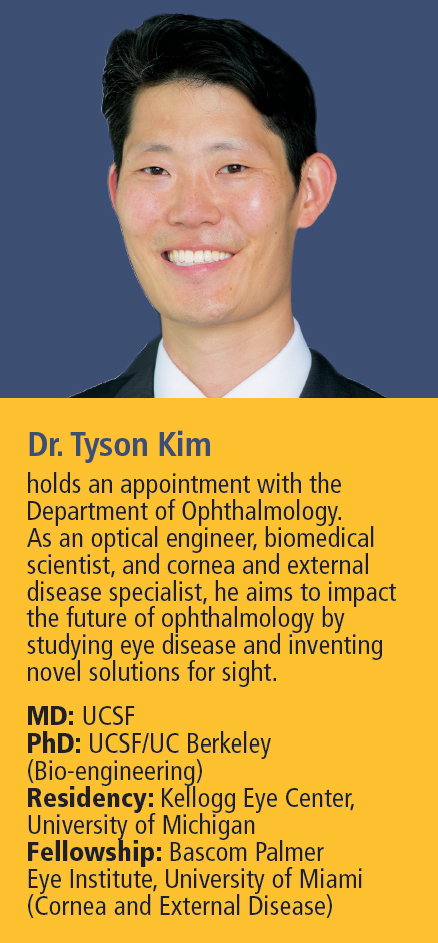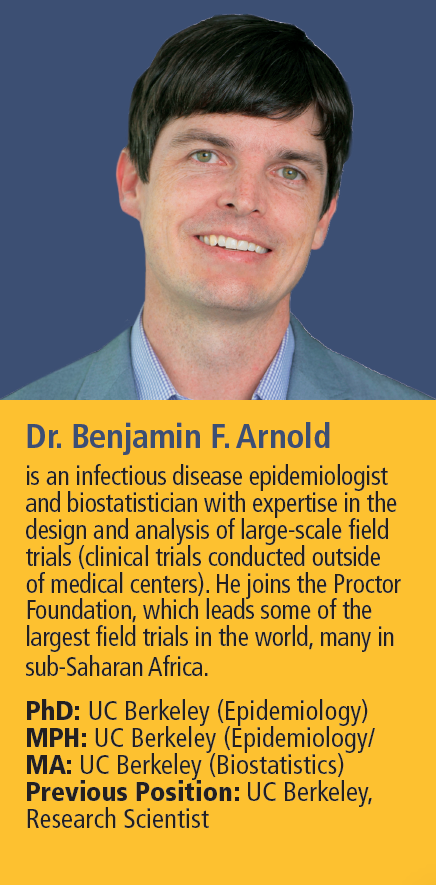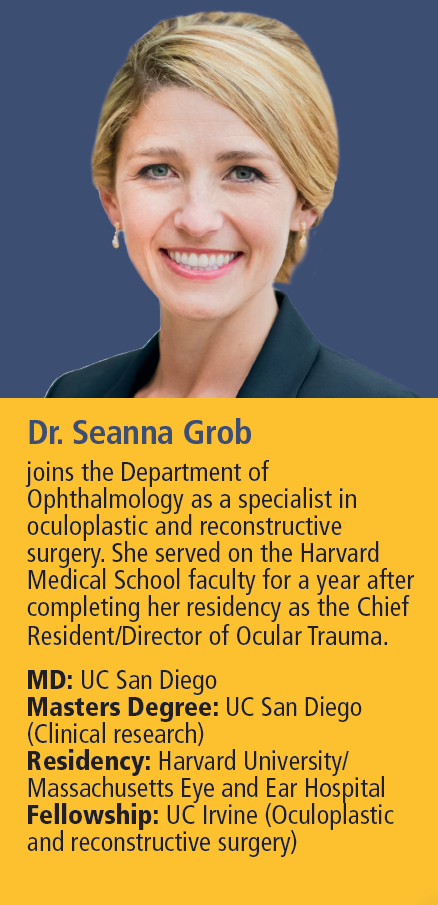Dr. Catherine Q. Sun
Q: What do you aim to achieve at UCSF?
A: I look forward to contributing to the growth of our excellent glaucoma division and department. I also want to advance glaucoma clinical care through interdisciplinary research.
Q: Why did you choose glaucoma?
A: I enjoy providing longitudinal care and surgical solutions for patients. Research to improve diagnostic and therapeutic strategies can transform the lives of millions of people facing glaucoma.
Q: How has your training shaped your research path?
A: UCSF emphasizes evidence-based medicine. As residents, we were given dedicated research time and presented our projects annually. The innovation was impressive! As a fellow, I used the IRIS Registry (the nation’s largest eye database) to study glaucoma surgical outcomes. Investigation of big data holds so much potential for breakthroughs in care. I’m excited to continue to learn and innovate.
Q: Why do you want to initiate “point-of-care” clinical trials?
A: This promising type of study isembedded into regular medical care. It’s a practical approach that can recruit large numbers of participants quickly and yield data from real-world ophthalmic care, using participants’ electronic medical records. These trials have the potential to accelerate research that benefits eye patients.
Q: What sparked your interest in clinical trials?
A: As a medical student, I spent a research year with the Proctor Foundation. Wonderful mentors there taught me the ins and outs of randomized controlled trials, which compare treatment efficacy. In my fellowship, I learned from mentors who conducted some of the pivotal glaucoma trials that guide practice today.
Q: How do you unwind?
A: I like good meals with friends, seeing musicals and ballet, traveling, and staying active with dance classes, running, and hiking. I often head to the South Bay on weekends to catch up with old friends and family.
Dr. Tyson Kim
Q: What drew you to ophthalmology?
A: The personal reward in helping a patient regain sight is very high. I love microsurgery and how a procedure can be transformative in a patient’s quality of life. Ophthalmology also aligns with my interests as a scientist and innovator. It is a phenomenal field for translating research and technology into improvements in patient care.
Q: How will you grow your research here at UCSF?
A: I will build a research lab that utilizes and develops advanced optical methods to study eye disease. One part of my research program will combine femtosecond laser technologies with transgenic models of disease to observe and alter cellular behavior during abnormal blood vessel development in the living eye. This can be particularly powerful for studying disease processes that are hard to recapitulate outside the body. Another aspect of my research focuses on the development and translation of low-cost and easy-to-use technologies in ophthalmic care.
Q: How were you instrumental in creating the RetinaScope?
A: RetinaScope is now a multiinstitutional effort that originally started at UC Berkeley and UCSF. I’m one of the inventors and led several clinical trials validating the technology. The device is an easy-to-use and low-cost way to image the retina. It can effectively detect referral-warranted diabetic retinopathy. We’re seeing how the technology can grow and hope to make it very accessible for places where it’s most needed.
Q: How do you enjoy your time outside of medicine?
A: I enjoy the city’s fun food culture and the Northern California outdoors. Music helps keep me balanced, and I like playing the violin. I also enjoy traveling.
Dr. Benjamin F. Arnold
Q: What attracted you to the Proctor Foundation?
A: Honestly, I’ve never seen a more dynamic and productive research faculty. They integrate extremely well across disciplines, which is where I think the most creative science tends to happen. A growing part of my research focuses on accelerating the elimination of neglected tropical disease through better surveillance methods. Proctor’s focus on global trachoma elimination is a perfect fit.
Q: What are the big takeaways from your studies on reducing diarrheal disease and malnutrition?
A: These maladies account for an enormous global disease burden. Although public health interventions such as cleaner water and nutritional supplements can prevent them in theory, it has proven difficult to dramatically improve child outcomes in practice. I plan to use lessons from 10-plus years of trials in this area to strengthen Proctor’s efforts to end trachoma and reduce child mortality.
Q: What interests you about leading the Data Coordination Center?
A: I’m excited to lead this large team of data scientists. As a methodologist, I think that combining the rich information we collect from study sites around the world with state-of-the-art data science will yield important new insights for eliminating disease. Mentoring junior scientists is one of the best ways to stay abreast of the latest scientific developments – especially in the fast-moving field of data science.
Q: What is your life like outside of medical research?
A: My family and I live a semi-rural existence at the edge of Oakland, complete with three children and a menagerie of horses, honey bees, and chickens. I love mountain biking with my kids on the trails near our house.
Dr. Seanna Grob
Q: What did your post-residency faculty year teach you?
A: I learned a lot about patient care for eye trauma, general ophthalmology, and resident education. I discovered that teaching and supervising are skills that require continual refinement. I learned how much I enjoy supporting residents through training and helping patients through challenging times.
Q: What led you to start a mental health clinic side by side with the eye trauma unit there?
A: The primacy of sight and the suddenness of eye trauma and vision loss heighten post-traumatic emotional responses. Patients were very excited to get mental health support. As I set it up, I realized that it could be helpful for many vision specialties. I hope to develop similar collaborations at UCSF.
Q: Why did you choose oculoplastic surgery as your specialty?
A: During an oculoplastics sub-internship in medical school, I enjoyed the combination of ophthalmology, head and neck surgery, plastic surgery, and dermatology. My exposure to oculoplastics as a resident and during fellowship furthered my excitement and dedication. My mentors inspired me with their passion for oculoplastics.
Q: What motivated you to choose a position at UCSF?
A: I’m joining an amazing group of oculoplastic surgeons and ophthalmologists, and UCSF is a preeminent medical institution with endless opportunities for multidisciplinary research, teaching, and leadership. I’m also excited to establish oculoplastics at the UCSF eye clinic in Berkeley.
Q: What did you enjoy about recently sky diving for the first time?
A: Flying over Interlaken, Switzerland, in a helicopter, then 45 seconds of free fall followed by floating down to an absolutely stunning view, was one of the most amazing experiences. As soon as I landed, I wanted to do it again.




